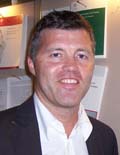last update feb 2012
The 'lab' is made up of faculty, graduate students and researchers from a number of departments within the university as well as from other institutions.
Patrick Adler
Patrick Adler is a Master's student pursuing a degree in Geography. He found his way to geography through a longstanding interest in regional economic development. He is interested in how regional variations in occupational structure , service provision, labor market regulation, transportation policy ,are related to development outcomes. His ongoing thesis research explores the role that same-day courier service plays in urban economic production, and examines the relationship between courier network strength and growth. He joined the lab in 2010 after working full time for two years as a Research Associate at the Martin Prosperity Institute where he works part time as a researcher and is involved in the Strengthinservices project.
Kate Geddie
Kate Geddie is a PhD Candidate in Geography at the University of Toronto whose interests range from economic geography and transnational migration to higher education and cultural industries. Her PhD research investigates the emerging issue of cities and countries competing to attract and retain international students as an economic development strategy. She is exploring the evolving policy and regulatory framework responding to this perceived competition, as well as the broad range of factors and processes shaping the post-graduation settlement and employment strategies of international graduate students through cases in Toronto, Canada and London, England. She is also involved in the ISRN project through a study with Meric Gertler on local labour market dynamics and design-related practices in the Toronto architecture industry. Prior to her PhD, she worked in European higher education policy.
Atle Hauge

I am a Norwegian, finished my PhD in Uppsala, Sweden in 2007 and am now a Post Doctoral Fellow at the UofT. The post-doc research project looks at user-driven innovation processes in the growing sports- and outdoor equipment industry. It focuses not only on how users help firms develop better technical products but also how taking users seriously helps firms build and commercialise their brands. My PhD was a take on Swedish fashion viewed through economic geography lenses. Fashion is an industry with both a material and an immaterial dimension - in the thesis there is an analysis of the interface between these dimensions, with a particular focus on the production of immaterial and symbolic value
(link to article). - Other areas of interest are regional and urban development, innovation systems, cultural industries, branding and consumption. When I am not working I like films (American Independent, Sci-Fi, romantic comedies), skiing (Telemark: free your heel - free your mind), fighting decay (running, playing football), reading stuff without references.


Brian Hracs
Brian is a PhD candidate in the Department of Geography and Planning at the University of Toronto. His broad research interests include the use of culture for local economic development, the ways in which digital technologies are restructuring the cultural economy and the impacts of new production models on individuals in the labour market. Specifically, his dissertation research examines the employment experiences and spatial dynamics of indie rock, classical and hip-hop musicians in Toronto. Other current research projects include work with Dr. Atle Hauge on the collaborative linkages between indie musicians and fashion designers and a paper with Dr. Bryan Massam on the role of built and virtual spaces in promoting civic conversations and participatory citizenship. In previous work, Brian has investigated the socio-economic outcomes of culturally driven strategies for economic development in rural and urban communities through research on Prince Edward County, Ontario, for his M.A., and in a related study on West Queen West in Toronto.


Mia Hunt
Mia Hunt completed her urban planning degree (MScPl) at the University of Toronto. She has since moved on to continue her studies at Royal Holloway University of London, where Mia's work explores materiality, place-making, and vernacular practice. Her PhD project considers everyday shop-keeping as a curatorial exercise and focuses on London's ad hoc consumption spaces - like pound shops, corner shops, and souvenir stands. The project weaves together her academic and professional backgrounds in urban planning, fine and applied arts, and community engagement. Mia's work is funded by the Social Science and Humanities Research Council of Canada, Royal Holloway, and the Department of Geography.
Jason F. Kovacs
Jason Kovacs is a Postdoctoral Research Fellow (SSHRC) in the Department of Geography at the University of Toronto. Jason received his PhD in Planning at the University of Waterloo. His dissertation examined the origins and evolution of cultural planning, as well as the development, content and outcomes of municipal cultural plans in Ontario mid-size cities. While at the University of Waterloo, Jason had also conducted research and published on several heritage planning issues with Dr Robert Shipley. Additionally, he has published papers relating to early Hungarian settlement in the Canadian Prairies, as well as on the topics of monuments and dissonant heritage, and cultural tourism and authenticity. Jason is currently investigating the effectiveness of metropolitan cultural plans and creative city strategies.
(more) Josephine Rekers
Josee is a doctoral student in the department of Geography, working under the supervision of Prof. Meric Gertler. Her research on the demand dynamics of systems of innovation examines the relationships between the knowledge foundation and social organization of knowledge communities. Through comparative case studies of musical theatre and health science in Toronto, she explores the institutional mechanisms
that are in place to evaluate and adopt new knowledge intensive products. Although highly scientific and cultural activities are both concentrated in large urban centres, this may be a spatial manifestation of social dynamics that are organized differently in
response to different knowledge foundations. In order to support the innovative or creative activities in each of these sectors, we need to enhance our understanding of their respective innovation processes. Josee is also working on a research project with Prof. Gertler, funded by SSHRC and Health Technology Exchange, on Ontario’s biomedical
industry sector.
past lab members
University of Toronto
Sidney Smith Hall
100 St. George Street, Rms. 5028 & 5029
Toronto, ON. M5G 3G3
Ph. # 416.978.6679






.jpg)

